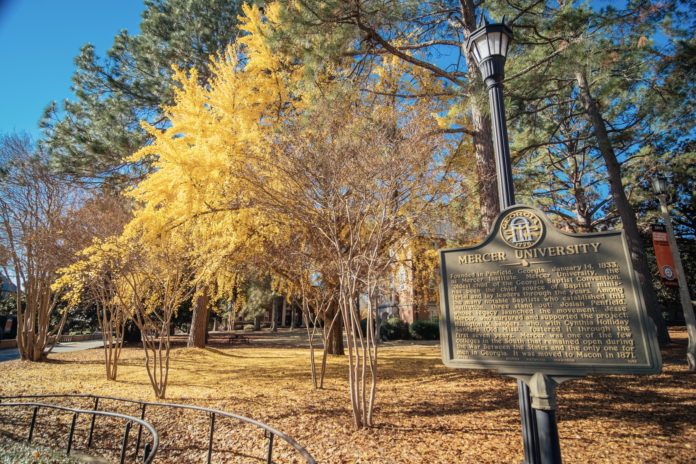(The following article was published Thursday, April 5, 2007, in the Macon Telegraph.)
By Jennifer Burk
jburk@macontel.com
Science and faith aren’t incompatible, a leading scientist told a group of about 900 people Wednesday in Macon.
“I don’t want to live in a place where science or faith has to triumph at the detriment of another,” said Dr. Francis S. Collins, an author and geneticist.
Collins spoke to a group of students, faculty and community members at Mercer University about belief in God and science. As director of the National Human Genome Research Institute, he oversaw the effort to sequence the entire human DNA code. He also is the author of “The Language of God: A Scientist Presents Evidence for Belief.”
Collins may be steadfast in his faith now, but he wasn’t always a Christian. During college, he said, he considered himself an atheist. Faith was a waste of time, and it could not be measured or quantified like science and mathematics, he recalled thinking.
But when he was in medical school, a terminally ill patient shared her faith with him. She asked him about his beliefs, and he felt uncomfortable because he didn’t have a foundation for his decision, he said.
So he went out in a quest to look for evidence to defend atheism. In doing so, he found God, he said.
“I had assumed that faith and science were opposites … and I realized … that in fact faith rests squarely on reason,” Collins said.
Collins gave five pointers to God that could be found in nature.
• There is something instead of nothing. There is no reason for there to be anything, he said, so something would have had to create it.
• Math is unreasonably effective. There’s no reason why math should be successful in explaining the world, unless someone made it that way. “There’s a mind behind it all,” he said.
• The universe had a beginning. Nature has not been observed to create itself, so something outside nature must have created it, he said.
• Physical constants, such as the gravitational constant, never change. If a constant were to change, life would not exist.
• Humans have a moral law. People have a belief in fairness and a generosity toward others that can’t be found in animals.
“God is interested in human beings,” he said.
In recent years, evolution has become a point of contention among believers and nonbelievers. Christians can believe in God and evolution, Collins said, by adopting theistic evolution, which allows that evolution could have been God’s method of creation.
This would involve not taking the Bible’s book of Genesis, which explains creation, literally, he said.
Collins added that other scientists share his beliefs.
“My God is both the God of the Bible and the God of the genome,” he said.
Collins’ lecture gave both Christians and atheists a lot to consider, said Steuart Botchford, a senior philosophy and economics major at Mercer, who considers himself an atheist. “I think (the lecture was) a very lucid account of what it means to be in the middle of the debate between science and Christianity,” he said, adding that he thinks Collins doesn’t always give atheism “a fair shake.”
Botchford said he has read Collins’ book and is trying to understand all sides of the issue of faith and science to better support his decision.
Veronica Allen, a senior political science major at Mercer, also attended the lecture in search of evidence. But she wanted to support her Christian faith.
“A lot of the things (Collins) said helped me find direction to take and find answers,” she said.
She said she feels her faith in her heart, but she wants to be able to explain it to others.
“To know that he is a scientist and a believer, that is good,” Allen said.
To contact writer Jennifer Burk, call 744-4345.










